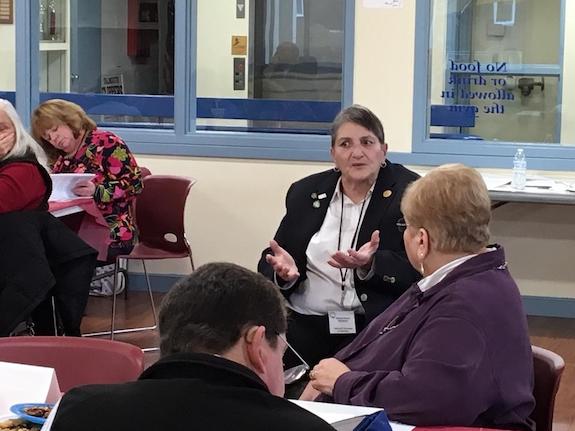Housing Roundtable
Sponsored by: Falmouth Disability Commission
For Kathleen Haynes, chairman of the Falmouth Commission on Disabilities, the numbers tell the story.
Falmouth has a disabled population of 14.2 percent, noticeably higher than the state average of 11.6 percent.
Knowing that, there was one fundamental question facing participants of a January 10 roundtable discussion at the Gus Canty Community Center: Why can’t disabled residents in Falmouth find adequate housing to address their needs?
“We haven’t done anything in Falmouth to address this,” Haynes said during the roundtable. “It needs to stop.”
Among those who attended the roundtable discussion were Falmouth Housing Coordinator Carla Feroni, Town Planner Tom Bott, Human Services Director Susie Hauptmann, Personnel Director Denise Coleman, and Affordable Housing Committee Chairman Edward Curley. Members of the town’s planning and zoning boards and commission on disabilities also attended the discussion, along with members of Cape Organization for Rights of the Disabled (CORD).
Haynes said many units in town that would be suitable for disabled residents are being rented to able-bodied tenants. She said as a former resident of the Tataket Apartments on Teaticket Highway, she has seen this for herself.
“I’ve lived the experience,” she said. “I know.”
To that end, some at the roundtable said they’d favor creating a list of disabled residents in town, this in an effort to better quantify the number of disabled people in town who need housing and help them get the housing they need. It was also suggested that an Office of Disabilities Services be created in town to manage that list.
Creating and maintaining such a list comes with some challenges. The specific medical information of residents on the list would have to be kept confidential to comply with the Health Insurance Portability and Accountability Act, more commonly known as HIPPA.
But Nadine McCall of CORD said there are ways of managing without running afoul of HIPPA laws.
“We can provide a list of disabled people and keep it confidential,” she said. “That is a solution.”
Bott said local zoning changes could be worked on requiring that the first floors of all multifamily houses in town been made handicap accessible.
Feroni suggested that a fund could be created in which residents could apply for money to modify their homes to be handicap accessible. Where the money would come from to support the fund would need to be discussed and decided upon, she said.
Public outreach and education was also suggested by roundtable participants.
“People don’t know where to go to get an accessible unit, or what’s expected of them,” Feroni said.
Haynes, meanwhile, said the town’s disabled population needs to be better considered in housing discussions among local boards and committees. Often times, she said, housing discussions center more upon the needs of young people and seniors than the disabled.
There was also discussion about whether residents with mental health and addiction issues should be included in the town’s disabled population. CORD officials say the state recognizes mental health as a disability, while persons actively seeking treatment for drug and alcohol addiction are also considered disabled.
Attendees voiced support for additional roundtable discussions to be held in the future. Haynes said she would like to host similar discussions throughout the year.
Source: Wicked Local Falmouth

